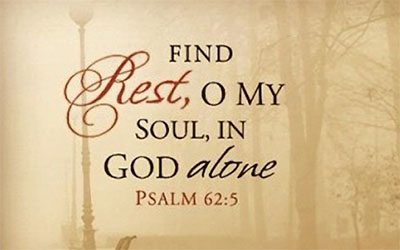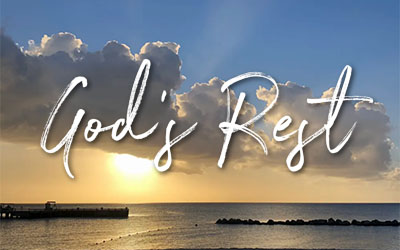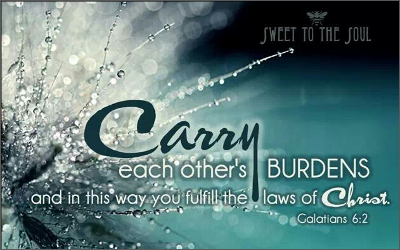Entering God’s Rest
Before Jesus took his last breath on the cross, he said: “It’s finished.” So just as God rested after he completed the work of creation, Jesus rested after he completed the work of saving man. It is his will that we enter this rest, yet so many Christians do not experience it, their walk with God is still weighed down with burdens as they try to achieve what only Jesus could achieve for them, and he had already done so.
The burden that man carries
(Bấm vào đây để đọc tiếng Việt)
 The burden that man must carry is both physical and spiritual, however, Jesus came to address mainly the later. Physical burden must be born by both believers and unbelievers alike, some enjoy a life of ease while others toil for their survival irrespective of spiritual condition. But when Jesus spoke the following well known verse: “Come to me, all you who are weary and burdened, and I will give you rest” (Matthew 11:28), was he not also talking about the physical burden, or perhaps at least together with the spiritual as well?
The burden that man must carry is both physical and spiritual, however, Jesus came to address mainly the later. Physical burden must be born by both believers and unbelievers alike, some enjoy a life of ease while others toil for their survival irrespective of spiritual condition. But when Jesus spoke the following well known verse: “Come to me, all you who are weary and burdened, and I will give you rest” (Matthew 11:28), was he not also talking about the physical burden, or perhaps at least together with the spiritual as well?
If it is Jesus’ will to relieve us of our physical burden, such as ill health, financial issues, etc., he would have easily solved them through various physical means. If he could create the universe and everything in it, he could very well restore your good health, and give you resources to fix your financial problems. Jesus didn’t die to provide solutions to man’s physical problems, he died for their sins, and the guilt that weighed them down. Therefore the burden of man that must be lifted is the burden of sin which can only be accomplished by Christ on the cross on our behalf. This burden is uniquely a spiritual one.
Religious burden
“Woe to you, experts in the law and you Pharisees, hypocrites! You cross land and sea to make one convert, and when you get one, you make him twice as much a child of hell as yourselves!” (Matthew 23:15)
The Pharisees make people children of hell not in the sense that they teach them to do evil things, or things against the law of God, but religious traditions which in reality drove them apart from him. They “study the scriptures thoroughly because they think in them they possess eternal life, and it is these same scriptures that testify about Jesus” (John 5:39). The scriptures became their god instead of the true God that the words pointed them to. In their mistaken notions, they pile the burden of the keeping of the law on believers, which in effect drives a wedge between them and God. The apostle Paul wrote clearly about this faulty belief as follows:
A person is not justified by the works of the law, but by faith in Jesus Christ. So we, too, have put our faith in Christ Jesus that we may be justified by faith in Christ and not by the works of the law, because by the works of the law no one will be justified (Galatians 2:16).
However, some may argue that they don’t preach the law for justification, but for sanctification. But the end result is the same, that though God may by his grace and mercies saves anyone who is in Christ, a believer’s life becomes a perpetual motion in trying to become “more sanctified,” to “please the Lord,” and even to meet expectations of others though oftentimes they are not at all based on any Biblical truths. Even demons believe certain things about God (James 2:19) but they’re far from having a trust relationship with God. Such is a relationship that many have with God. They view God through a lens almost universally held by all religions of the world. They see a God with expectations and goals that are impossible to achieve. They see a God who is ready to nail them for every little mistake they make.
Their burden is not physical, but purely a spiritual one. They always felt they needed to get right with God through the keeping of the law. We saw this in the book of Acts, when the apostles and leaders of the church in Jerusalem met to debate whether to impose the law of Moses on Gentile believers, the apostle Peter argued against it saying:
“7Brothers, you know that some time ago God chose me to preach to the Gentiles so they would hear the message of the gospel and believe. 8And God, who knows the heart, has testified to them by giving them the Holy Spirit just as he did to us, 9and he made no distinction between them and us, cleansing their hearts by faith. 10So now why are you putting God to the test by placing on the neck of the disciples a yoke that neither our ancestors nor we have been able to bear? 11On the contrary, we believe that we are saved through the grace of the Lord Jesus, in the same way as they are (Acts 15:7-11).
The burden that neither their ancestors nor they could bear. This was the type of burden that Jesus promised he would deliver us from. Therefore, the deliverance from the demand of the law was the “rest” that Jesus hinted at when he made the promise in Matthew 11:28. It was also this rest that the author of Hebrews 4:11 asks us to make every effort to enter into. And it is also this rest that God had given the Israelites in the form of the observance of the Sabbath day as a foreshadow of the true rest in Christ.
Jesus’ yoke and burden
Jesus’ yoke and burden is the cross and the sin of the world. When he asks us to take his yoke, he does not mean it in the same way most folks understand. His yoke is the cross that requires his death, and only his death is meaningful as it is the only sacrifice that can meet God’s requirement as the payment for the sin of the world. Therefore he could not have asked us to do the thing that only he could do.
Therefore to take up Jesus’ yoke can only mean to accept his free gift of the cross as if we ourselves died on the cross. This truth is presented in several passages in Scriptures that the death that was counted toward us was a done deal, that though we haven’t physically died, we are considered dead toward everything that Jesus died for.
We were therefore buried with him through baptism into death in order that, just as Christ was raised from the dead through the glory of the Father, we too may live a new life (Romans 6:4).
But now, having died to what bound us, we have been released from the Law, so that we serve in the new way of the Spirit, and not in the old way of the written code (Romans 7:6).
Have you noticed the past tense in these verses? We’re still alive and yet we were considered as buried with Christ, as having died and been released from the law. It’s the same way with the yoke that Jesus took and counted it toward us so our debt may be considered paid in full.
Jesus paid it all so we may enter that precious rest that all of mankind have been longing for since the time of Adam. Jesus took the burden, the burden so huge that it encompasses all of the sins of man since the beginning of time and forevermore, so that we don’t have to bear it. The need to continually pay for each and every single sin of ours is now replaced by the once-for-all payment by the Son of God on the cross. Now those who accept Jesus’ payment as his own may rest. And this rest is not just a nice thing to have, it’s actually commanded to us in Scriptures:
Let us, therefore, make every effort to enter that rest (Hebrews 4:11).
The effort we must make is not in doing something no matter how noble, but in trying to get into that place of rest. This is contrary to common belief in Christian living where the idea of rest is usually associated with laziness, with the abuse of God’s grace, and busyness is almost always exalted as a virtue. Hence the call to rest, as in the story of Mary and Martha where Jesus praised Mary for choosing the better thing, the resting at his feet, as the better choice that no one can take away from her, becomes a best kept secret, or to some others a heresy that must be banned from pulpits.
But it shouldn’t be a secret as our Redeemer talked about it often while he was here on earth. He talked about rest, about the setting of the captives free, about living water that satisfies forever, about burden lifted, and about the forgiveness of sin.
It’s finished
There is no greater proclamation of the call to rest than what Jesus uttered on the cross at his final moment: “It’s finished!” (John 19:30). To the weary and heavily burdened who grew to understand what Jesus meant, this utterance is the split in the curtain that separated them from God, it’s the parting of the Red Sea, it’s the resurrection of the Christ, of the proclamation of the accessibility of the throne of grace, and of practical down-to-earth importance, it’s a huge boulder off their back that they can now stop trying to measure up to God’s impossible standard. Jesus did all that was needed by us to please God, or in other words, Jesus fulfilled all that God required of us to meet his standard of righteousness.
You are thereby permitted to lay your burden down, to stop trying to be “like God, knowing good and evil” and to start trusting in God who really knows good and evil, who not only knows what good for you to do and what bad for you to avoid but also to give you his creative power to accomplish his will as he has already prepared for you even before you were formed in your mother’s womb. The apostle Paul wrote this of himself that it was God who set him apart from his mother’s womb and called him by his grace to preach the gospel among the Gentiles (Galatians 1:15). What was Paul doing before this calling? Did he earnestly pray that God would call him into ministries? Did he prepare himself for the great task ahead? Did the church lay hands and pray upon him that God would use him mightily? None of the above. On the contrary, he was the enemy of the gospel. God did this to Paul, and to us, so that none among us can claim any credit toward any works of God, so that there would be no doubt in anyone’s mind that God is the author of all good works toward his kingdom.
Enter into God’s rest. It’s the better thing for you to choose and no one can take it away from you. It is the unfinished business with God, the unfinished business with sin and the law, that robs you of the peace, the abundant life, the living water, that Jesus promised you when he invited you to put your trust in him. Trust him. Your business with God, sin, and the law was finished, and Christ made sure of that at Calvary. You are no longer in debt. Come home and rest.
And they shall teach no more every man his neighbor, and every man his brother, saying, Know the LORD: for they shall all know me, from the least of them to the greatest of them, said the LORD: for I will forgive their iniquity, and I will remember their sin no more (Jeremiah 31:34).
Grace and peace be with you
Nghi Nguyen
- Scripture quoted by permission. All scripture quotations, unless otherwise indicated, are taken from the NET Bible® copyright ©1996-2006 by Biblical Studies Press, L.L.C. All rights reserved.
Disclaimer: This is my own opinion on the topic, which does not necessarily reflect the church's theology, or beliefs of the individuals in it — Nghi Nguyen


